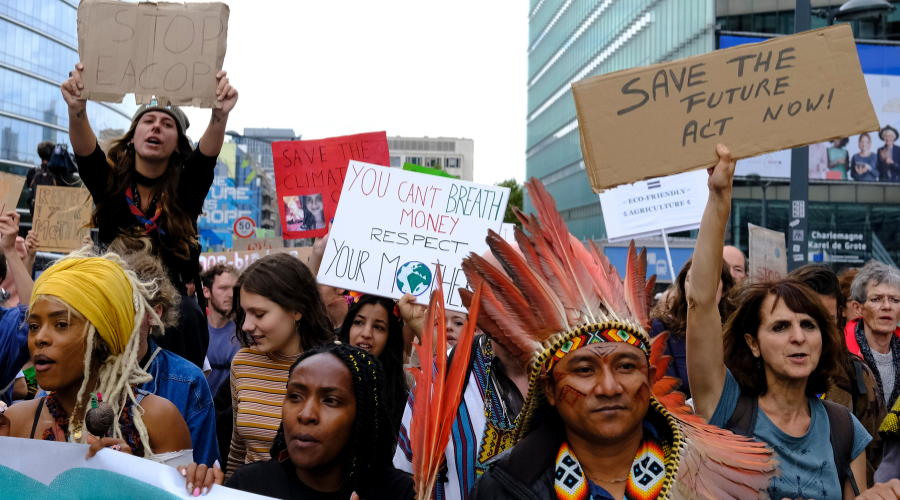
Telling the Climate Change bedtime story: Empowering Children with Critical Thinking on Climate Change
28 July 2025
It is high time to bring the IPCC’s science to life: The case for an art-science residency network
28 July 2025By Edoardo GAGGI
Indigenous peoples make up six percent of the global population, but they conserve 80 percent of the remaining biodiversity worldwide[i]. Having lived in direct contact with the land for generations, they possess vital ancestral knowledge on how to adapt, mitigate, and reduce climate disasters locally[ii]. These “complex knowledge system[s] grounded in generations of place-based observations and experiences” are usually referred to as Traditional Ecological Knowledge (TEK)[iii]. For instance, Indigenous communities in the West African Sahel have reduced adverse impacts of droughts for years, through mitigation (emission reduction, carbon sequestration, carbon substitution. etc.) and adaptation practices (weather forecasting, vulnerability assessment, etc.)[iv].
For centuries, climate scientists have neglected TEK, while recently, a growing body of literature illustrates how TEK can contribute to limiting global warming to less than 1.5ºC and adapting to its consequences. However, historians of climate science warn that scientific interest in TEK is far from new[v]. This misconception derives from the imperialist and colonialist context in which climate science was born, which has led to the subordination, omission, and devaluation of TEK. In fact, several studies have demonstrated how climate science and TEK have invisibly been interacting for long[vi]. For instance, prominent white scientists from the Global North, such as the Swedish geographer Hans Ahlmann and the German naturalist Alexander Von Humboldt, incorporated vital observations shared by local and indigenous groups into their research on the Arctic icesheet and ocean currents respectively[vii].
Today, climate science continues to prevail over TEK. Even the IPCC – the highest scientific authority on the topic – has been reluctant to credit indigenous knowledge. However, compared to the first IPCC Assessment Report (AR1) published in 1990, the latest ones have started to timidly emphasize its importance. Initially, the value of indigenous knowledge has been emphasized in the context of climate change adaptation, which has traditionally been associated with local action. Progressively, TEK has been also integrated into mitigation strategies, historically perceived as a global issue[viii].
While the IPCC has slowly been recognizing the value of TEK, its reports construct Indigenous peoples and knowledge in a simplistic way. Indeed, an analysis of AR4 (2007), AR5 (2014), and two special reports (2019) unveils that the panel framed Indigenous peoples as vulnerable objects (rather than subjects) of climate governance to protect, neglecting their agency. In parallel, the IPCC portrayed TEK as a “source of information that can supplement science if [it] prove[s] useful” rather than an independent knowledge system[ix].
The exclusion of Indigenous peoples from climate knowledge production seems to be the result of intentional design rather than mere coincidence. This phenomenon can be attributed to ostensibly apolitical practices prevalent within the IPCC, including expert selection[x]. Considering that, for instance, only nine out of 309 authors of Working Group II (AR5) had publishing records in climate change and indigenous studies, it’s not surprising that the IPCC mischaracterized Indigenous peoples and knowledge[xi].
Including Indigenous knowledge and experience in the next AR would translate into enhanced climate action. To do so, the IPCC should: include a specific indigenous-focused chapter, promote greater involvement of experts on Indigenous peoples, develop specific guidelines for accessing and incorporating TEK and, eventually, publish a special report on Indigenous peoples and climate change[xii].
[i] World Bank 2023
[ii] Idem
[iii] Ford et al. 2016, p. 350
[iv] Nyong et al. 2007
[v] Mercer et al. 2023
[vi] Idem
[vii] Sörlin 2011; Cushman 2011
[viii] Brugnach 2017
[ix] Rashidi et al. 2023, p. 1315
[x] Rashidi et al. 2023
[xi] Ford et al. 2012
[xii] Ford et al. 2016
Bibliography
Brugnach, M., Craps, M., & Dewulf, A. R. P. J. (2017). Including indigenous peoples in climate change mitigation: addressing issues of scale, knowledge and power. Climatic change, 140, 19-32.
Cushman, G. T. (2011). Humboldtian science, creole meteorology, and the discovery of human-caused climate change in South America. Osiris, 26(1), 19-44.
Ford, J. D., Cameron, L., Rubis, J., Maillet, M., Nakashima, D., Willox, A. C., & Pearce, T. (2016). Including indigenous knowledge and experience in IPCC assessment reports. Nature Climate Change, 6(4), 349-353.
Ford, J. D., Vanderbilt, W., & Berrang-Ford, L. (2012). Authorship in IPCC AR5 and its implications for content: climate change and Indigenous populations in WGII. Climatic change, 113, 201-213.
Mercer, H., & Simpson, T. (2023). Imperialism, colonialism, and climate change science. Wiley Interdisciplinary Reviews: Climate Change, 14(6), e851.
Nyong, A., Adesina, F., & Osman Elasha, B. (2007). The value of indigenous knowledge in climate change mitigation and adaptation strategies in the African Sahel. Mitigation and Adaptation strategies for global Change, 12, 787-797.
Rashidi, P., & Lyons, K. (2022). Democratizing global climate governance? The case of indigenous representation in the Intergovernmental Panel on Climate Change (IPCC). In Economics and Climate Emergency (pp. 284-299). Routledge.
Sörlin, S. (2011). The anxieties of a science diplomat: Field coproduction of climate knowledge and the rise and fall of Hans Ahlmann’s “Polar Warming”. Osiris, 26(1), 66-88.
World Bank (2023). Indigenous Peoples. https://www.worldbank.org/en/topic/indigenouspeoples#1


